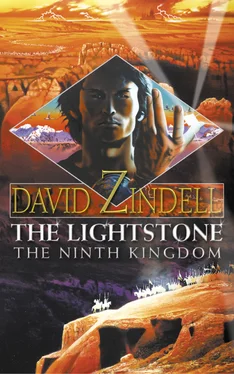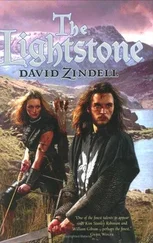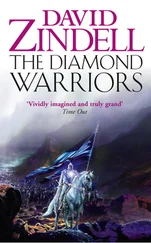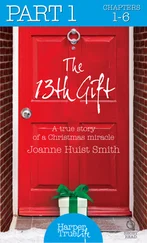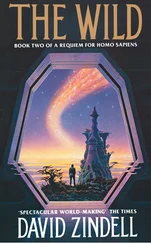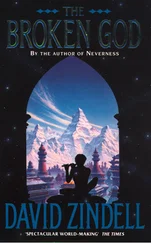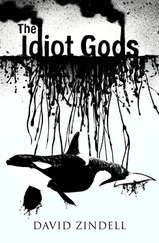I felt something else there that seemed as out of place as a snow tiger in a jungle or the setting of the sun in the east. The air, dark and heavy, almost screamed with a sense of wrongness that chilled me to the bone. I felt eyes watching me: those of the squirrels and the cawing crows and perhaps others as well. For some reason, I suddenly thought of the lines from The Death of Elahad – Elahad the Great, my distant ancestor, the fabled first king of the Valari who had brought the Lightstone to Ea long, long ago. I shuddered as I thought of how Elahad’s brother, Aryu, had killed Elahad in a dark wood very like this one, and then, ages before Morjin had ever conceived of such a crime, claimed the Lightstone for his own:
The stealing of the gold, The evil knife, the cold – The cold that freezes breath, The nothingness of death.
My breath steamed out into the coolness of the silent trees as I caught a faint, distant scent that disturbed me. The sense of wrongness pervading the woods grew stronger. Perhaps, I thought, I was only dwelling on the wrongness of Elahad’s murder. I couldn’t help it. Wasn’t all killing of men by men wrong? I asked myself.
And what of killing, itself ? Men hunted animals, and that was the way the world was. I thought of this as the scar above my eye began to tingle with a burning coldness. I remembered that once, not far from here, I had tried to kill a bear; I remembered that sometimes bears went wrong in their hearts and hunted men just for the sport of it.
I gripped my bow tightly as I listened for a bear or other large animal crashing through the bushes and bracken all about us. I listened to Maram stepping close behind me and to Asaru following him. Maram, curiously, despite his size, could move quietly when he wanted to. And he could shoot straight enough, as the Delian royalty are taught. We Valari, of course, are taught three fundamental things: to wield a sword, to tell the truth, and to abide in the One. But we are also taught to shoot our long yew bows with deadly accuracy, and some of us, as my grandfather had taught me, to move across even broken terrain almost silently. I believe that if we had chanced upon a bear feasting upon wild newberries or honey, we might have stepped up close to him unheard and touched him before being discovered.
That is, we might have done this if not for Maram’s continual comments and complaints. Once, when I had bent low to examine the round, brown pellets left behind by a deer, he leaned up against a tree and grumbled, ‘How much farther do we have to go? Are you sure we’re not lost? Are you sure there are any deer in these wretched woods?’
Asaru’s voice hissed out in a whisper, ‘Shhh – if there are any deer about, you’ll scare them away.’
‘All right,’ Maram muttered as we moved off again. He belched, and a bloom of beer vapor obliterated the perfume of the wildflowers. ‘But don’t go so fast. And watch out for snakes. Any poison ivy.’
I smiled as I tugged gently on the sleeve of his red tunic to get him going again. But I didn’t watch for snakes, for the only deadly ones were the water dragons which hunted mostly along the streams. And the only poison ivy that was to be found in Mesh grew in the mountains beyond the Lower Raaswash near Ishka.
We walked for most of an hour while the clouds built into great black thunderheads high in the sky and seemed to press down through the trees with an almost palpable pressure. Still I felt something calling me, and I moved still deeper into the woods. I saw an old elm shagged with moss, a clear sign that we were approaching a place I remembered very well. And then, as Maram drew in a quick breath, I turned to see him pointing at the exposed, gnarly root of a great oak tree.
‘Look,’ he murmured. “What’s wrong with that squirrel?’
A squirrel, I saw, was lying flat on the root with its arms and legs splayed out. Its dark eye stared out at us but appeared not to see us. Its sides shook with quick, shallow breathing.
I closed my eyes for a moment, and I could feel the pain where something sharp had punctured the squirrel beneath the fur of its hind leg. It was the sharp, hot pain of infection, which burned up the leg and consumed the squirrel with its fire.
‘Val?’
Something dark and vast had its claws sunk into the squirrel’s fluttering heart, and I could feel this terrible pulling just as surely as I could Maram’s fear of death. This was my gift; this was my glory; this was my curse. What others feel, I feel as well. All my life I had suffered from this unwanted empathy. And I had told only one other person about its terrors and joys.
Asaru moved closer to Maram and pointed at the squirrel as he whispered, Val has always been able to talk to animals.’
It was not Asaru. Although he certainly knew of my love of animals and sometimes looked at me fearfully when I opened my heart to him, he sensed only that I was strange in ways that he could never quite understand. But my grandfather had known, for he had shared my gift; indeed, it was he who gave it to me. I thought that like the color of my eyes, it must have been passed along in my family’s blood – but skipping generations and touching brother and sister capriciously. I thought as well that my grandfather regarded it as truly a gift and not an affliction. But he had died before he could teach me how to bear it.
For a few moments I stared at the squirrel, touching eyes. I suddenly remembered other lines from The Death of Elahad ; I remembered that Master Juwain, at the Brotherhood’s school, had never approved of this ancient song, because, as he said, it was full of dread and despair:
And down into the dark,
No eyes, no lips, no spark.
The dying of the light,
The neverness of night.
Maram asked softly, ‘Should we finish him?’
‘No,’ I said, holding up my hand. ‘It will be dead soon enough. Let it be.’
Let it be, I told myself, and so I tried. I closed myself to this dying animal then. To keep out the waves of pain nauseating me, by habit and instinct, I surrounded my heart with walls as high and thick as those of my father’s castle. After a while, even as I watched the light go out of the squirrel’s eye, I felt nothing.
Almost nothing. When I closed my eyes, I remembered for the thousandth time how much I had always hated living inside of castles. As much as fortresses keeping enemies out, they are prisons of cold stone keeping people within.
‘Let’s go,’ I said abruptly.
Where does the light go when the light goes out? I wondered.
Asaru, it seemed, had also tried to distance himself from this little death. He moved off slowly through the woods, and we followed him. Soon, near a patchwork of ferns growing close to the ground, we came upon a splintered elm that had once been struck by lightning. Although the wood of this fallen tree was now brown and crumbling with rot, once it had been white and hard and freshly scorched.
Once, in this very place, I had come upon the bear that Lord Harsha had spoken of. It had been a huge, brown bear, a great-grandfather of the forest. Upon beholding this great being, I had frozen up and been unable to shoot him. Instead, I had lain down my bow and walked up to touch him. I had known the bear wouldn’t hurt me: he had told me this in the rumbling of his well-filled belly and the playfulness of his eyes. But Asaru hadn’t known this. Upon seeing me apparently abandoning all sense, he had panicked, shooting the bear in the chest with an arrow. The astonished bear had then fallen on him with his mighty paws, breaking his arm and smashing his ribs. And I had fallen on the bear. In truth, I had jumped on his back, pulling at his thick, musky fur and stabbing him with my knife in a desperate attempt to keep him from killing Asaru. And then the bear had turned on me as I had turned on him; he had hammered my forehead with his sharp claws. And then I had known only blackness until I awoke to see Andaru Harsha pulling his great hunting spear out of the bear’s back.
Читать дальше
